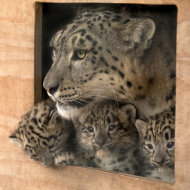
RZSS Highland Wildlife Park has welcomed the arrival of a litter of snow leopard cubs. The cubs were born to mum Animesh and dad Chan seven weeks ago and have started to explore life outside the cubbing box.
Keepers are delighted with the arrival, though say the coming weeks are critical for the cubs’ survival. Una Richardson, the park’s head of carnivores, said: “We are thrilled, though we remain cautious as this is still a very delicate stage in their development. Animesh has had three cubs and they will be health checked by our keepers and vets around three weeks from now.”
“Snow leopards are relatively solitary animals, so dad Chan is living separately from Animesh and the cubs, who will remain with their mum until they are around two years old.”
Image (C) RZSS Highland Wildlife Park.



 The Federation of Independent Veterinary Practices (FIVP) has announced a third season of its podcast, Practice Matters.
The Federation of Independent Veterinary Practices (FIVP) has announced a third season of its podcast, Practice Matters.